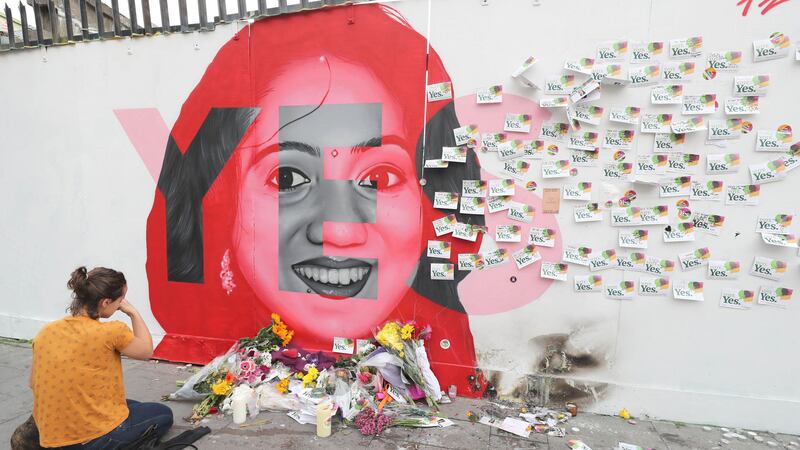It was day that has been described as many things, momentous, historic, a landslide, a social earthquake, and the referendum result to repeal the Eighth Amendment was all of those things and more.
The pace of social change in the Irish Republic has been staggering.
My childhood memories of crossing the border are still the twice a day recital of the Angelus, the hangover from de Valera's era was plain to see in every aspect of Irish society.
The Charles Haughey and Garrett FitzGerald years offered little in the way of change or modernisation for Irish women, still considered little more than vessels to populate the religiously conservative nation.
The repeal movement was described as a grassroots campaign, and it was that.
While the leaders of the all the main political parties in the south eventually backed repeal, some were very late to sense what way the wind of change was blowing.
Sinn Féin leader Mary Lou McDonald came into her own in the lead up to last Friday's election.
When she took over from Gerry Adams she said she would bring her own shoes, and she did that and wore them out on the campaign trail, but it must be noted that the party only changed its policy in cases of fatal foetal abnormality in 2015, and further liberalised the official position in November last year.
While women from across the political spectrum campaign tirelessly in the last year the change in attitudes in the south are much more than just political and go back a decade or more.
The real bravery came from those women who told their stories, who spoke of travelling to England after being told their much longed for baby had zero chance of survival.
Those who were raped and never told a soul until recently, those who walked around strange English cities alone and afraid and in pain.
The silent yes was what caused the landslide for the repeal campaign, the older men and women who had seen the damage the legislation caused since it was introduced, the thousands of women silenced by social shame.
Those people people finally got to say never again, they got to do it in the privacy of a ballot box and did so in record numbers.
Ireland will never be the same again thanks to those who did tell their heartbreaking stories, who fought back against decades of patriarchal shame.
There are a large number of no voters who have genuine concerns and fears, who do genuinely care about what this legislative change means and they should have their fears addressed over the coming months.
Fatal foetal abnormality means just that. It means a baby will not and cannot survive outside the womb.
It does not mean disabled children, those with Down Syndrome or other limiting but not fatal conditions.
Most of us have disabled children in our lives and families, children who bring love, joy and happiness.
Those children were used by sections of the no campaign but there is nothing in the draft legislation that will allow for abortion to be used as a form of genetic selection.
It is instead intended to be a compassionate legislative change for a kinder society that does not export tragedy.
Another impact of the weekend's historic event was once again to shine a spotlight on the socially repressive society women and members of the LGBT community endure in Northern Ireland.
Abortion it seems will be available by crossing the border or getting a plane but there is still no action from Westminster, who have the power in the absence of a devolved assembly to legislate on the issue but refuse.
The sudden interest in this from British feminists and campaigners who previously ignored Northern Ireland has been treated with raised eyebrows by some.
Feminist activist Rachel Watters this week wrote a searing article calling on British feminists and politicians to finally wake up to the plight of women living here.
"We have persisted in advocating for our bodily autonomy while mainstream feminism in Great Britain tossed us a few sympathetic articles", she said.
The bandwagon jumpers are many but those who are prepared to take action are still relatively few, Labour MP Stella Creasy being a notable exception.
Ireland has changed forever, part of it at least. The conversations and openness this campaign prompted must now continue, for a battle has been won but the war on inequality is far from over.








